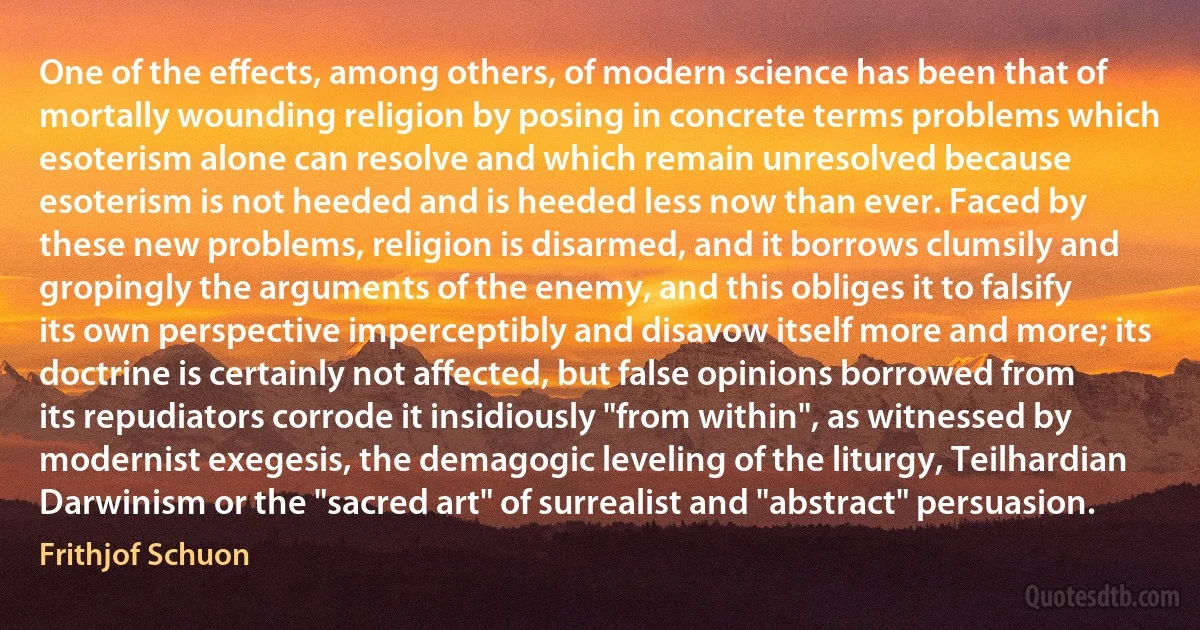
One of the effects, among others, of modern science has been that of mortally wounding religion by posing in concrete terms problems which esoterism alone can resolve and which remain unresolved because esoterism is not heeded and is heeded less now than ever. Faced by these new problems, religion is disarmed, and it borrows clumsily and gropingly the arguments of the enemy, and this obliges it to falsify its own perspective imperceptibly and disavow itself more and more; its doctrine is certainly not affected, but false opinions borrowed from its repudiators corrode it insidiously "from within", as witnessed by modernist exegesis, the demagogic leveling of the liturgy, Teilhardian Darwinism or the "sacred art" of surrealist and "abstract" persuasion.
Frithjof SchuonRelated topics
abstract art concrete darwinism doctrine enemy exegesis false less leveling liturgy modernist now persuasion posing religion remain science wounding others surrealistRelated quotes
The zealous care with which J. M. W. Turner endeavoured to do his duty, is proved by a large existing series of drawings, exquisitely tinted, and often completely coloured, all by his own hand, of the most difficult perspective subjects-illustrating not only directions of line, but effects of light - with a care and completion which would put the work of any ordinary teacher to utter shame. In teaching generally - he would neither waste time nor spare it - he would look over a student's drawing at the Academy, point to a defective part, make a scratch on the paper at the side, say nothing. If the student saw what was wanted, and did it, Turner was delighted; but if the student could not follow. Turner left him.

John Ruskin
If we refuse...what are the prospects? Repression, and nothing but repression, and it is a very uncomfortable repression; a kind of repression from which we shall get neither credit nor success. It is the repression of the masses of the people, the great proportion of these masses being women and children. It is the repression not of organisations and not of bodies; it will develop into the repression of the whole of the population. ... If, on the other hand, you wish to bind India to you by bonds of confidence, to make her happy within your Empire and Commonwealth, if you wish to hear her praise you in gratitude and remain with you in pride, then accept the work that has been done by the Conference, and instruct the Government to proceed with it to a complete conclusion.

Ramsay MacDonald
Man found that he was faced with the acceptance of "spiritual" forces, that is to say such forces as cannot be comprehended by the senses, particularly not by sight, and yet having undoubted, even extremely strong, effects. If we may trust to language, it was the movement of the air that provided the image of spirituality, since the spirit borrows its name from the breath of wind (animus, spiritus, Hebrew: ruach = smoke). The idea of the soul was thus born as the spiritual principle in the individual. Observation found the breath of air again in the human breath, which ceases with death; even today we talk of a dying man breathing his last. Now the realm of spirits had opened for man, and he was ready to endow everything in nature with the soul he had discovered in himself.

Sigmund Freud
A man who for a long time has gone around hiding a secret becomes mentally deranged. At this point one would imagine that his secret would have to come out, but despite his derangement his soul still sticks to its hideout, and those around him become even more convinced that the false story he told to deceive them is the truth. He is healed of his insanity, knows everything that has gone on, and thereby perceives that nothing has been betrayed. Was this gratifying to him or not; he might wish to have disposed of his secret in his madness; it seems as if there were a fate which forced him to remain in his secret and would not let him go away from it. Or was it for the best, was there a guardian spirit who helped him keep his secret.

Soren Kierkegaard
Noiselessly Kerchak entered, crouching for the charge; and then John Clayton rose with a sudden start and faced them.
The sight that met his eyes must have frozen him with horror, for there, within the door, stood three great bull apes, while behind them crowded many more; how many he never knew, for his revolvers were hanging on the far wall beside his rifle, and Kerchak was charging.
When the king ape released the limp form which had been John Clayton, Lord Greystoke, he turned his attention toward the little cradle; but Kala was there before him, and when he would have grasped the child she snatched it herself, and before he could intercept her she had bolted through the door and taken refuge in a high tree.

Edgar Rice Burroughs
